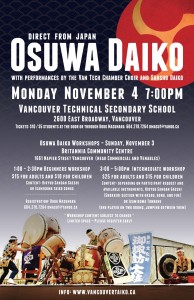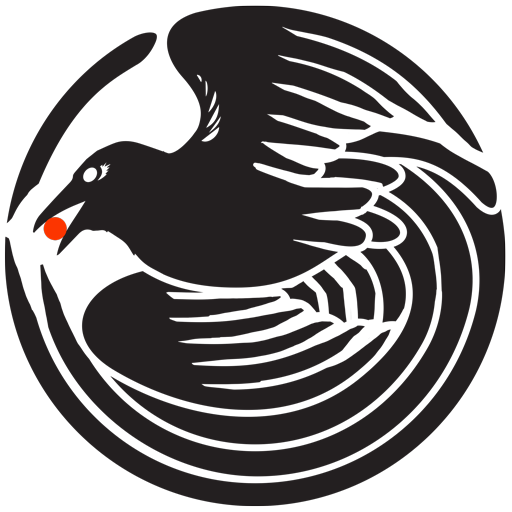 Osuwa Daiko Concert
Osuwa Daiko ConcertMonday, November 4, 7:00pm
Vancouver Technical Secondary School
2600 East Broadway, Vancouver
T: 604.713.8215 | F: 604.713.8214
www.vtmusic.caOsuwa Daiko Workshops
Sunday, November 3, 2013
1:00pm Beginner workshop for general public
3:00pm Workshop for taiko players (or possibly evening)
Britannia Community Centre
1661 Napier Street, Vancouver
Info: Doug Masuhara
dmasu1@yahoo.ca
604-718-5800
Osuwa Daiko
by Jabob Derksen
Taiko is still not quite as widely known as karate or judo but an increasing people from all ethnic and cultural groups have at least heard of it if not seen it performed. This year Vancouverites have been provided a numerous opportunities to see some really great performances and November will be even more exceptional with a performance by Osuwa Daiko who have the distinction of being the very first contemporary Japanese drumming group.
The performance art often referred to in the West as taiko has gained tremendous popularity since it emerged in post-war Japan. The word taiko actually just means drum in Japanese and may refer to any of a number of different styles or sizes of drums that have been used in Japanese music for centuries. The contemporary style that we’ve become familiar with is more properly known as kumidaiko, or ensemble drumming, the term applied to the style of drumming that was developed in 1951 by a Japanese jazz drummer named Oguchi Daihachi.*
Kumidaiko grew out of both festival drumming and the more religiously focused temple and shrine drumming but is inexorably infused with elements of jazz. As the story goes, Oguchi was sought out after a piece of written music was found in an old miso warehouse owned by one of his relatives. The music itself came from the journal of a Meiji era ancestor who made reference to drumming activities that even in the late 19th century included the revival of older traditional styles of drumming that were in danger of being completely forgotten.
The particular drum style referred to is kagura-daiko, an ancient drumming tradition that plays a role in Shinto ritual. According to Oguchi this style had gone out of use a hundred years earlier and no one could interpret the score. As Benjamin Pachter relates in his doctoral thesis, Wadaiko in Japan and the United States: The Intercultural History of a Musical Genre, Oguchi explained his predicament as a jazz-trained drummer attempting to interpret this ancient score as akin to that of a Western-style cook taking an order for sushi. Nevertheless, Oguchi persevered and was eventually able to decipher the music. What he did back in 1951, however, is what has proved so revolutionary. In a perfect fusion of traditional and contemporary Oguchi put together a set of various styles of Japanese drums such as those used in festival drumming, in kabuki and noh, and he arranged them in a manner not dissimilar from his Western-style drum kit. In addition to teaching the kagura-daiko piece to others so that they might perform it with him at the Suwa Grand Shrine, he also increased the tempo of the music to make it more like the jazz he was familiar with. The rest, as they say, is history.
While Oguchi-sensei passed away in 2008 his legacy lives on in his daughter, Oguchi Kasumi, his grandson, Yamamoto Makoto, and the other members of Osuwa Daiko. In fact, given the tremendous influence that Oguchi-sensei and Osuwa Daiko have had world-wide, it can be said that Oguchi’s legacy lives on in every taiko player who plays the contemporary style he developed just over sixty years ago. Vancouverites will have an opportunity to see Osuwa Daiko perform on November 4, 2013 at the Vancouver Technical Secondary School, 2600 E. Broadway Ave. Doors open at 6:30pm.
*In this article I will follow Japanese convention with the names of Japanese nationals and give their family names before their given names.
Jacob Derksen counts meeting Oguchi Daihachi as one of the highlights of his taiko life.

